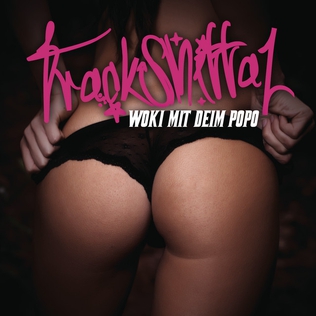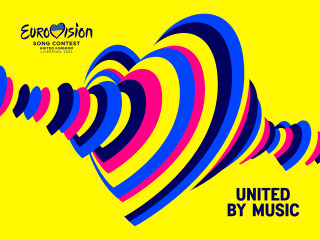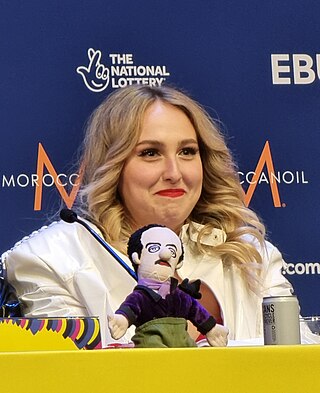
Austria has participated in the Eurovision Song Contest 56 times since its debut in 1957. The country has won twice, in 1966 and 2014, and such it holds the record for the longest gap between consecutive wins — 48 years. The contest is broadcast in Austria by ORF. Vienna was the host city on both of the occasions that the contest was held in Austria, in 1967 and 2015.

The Eurovision Song Contest 2015 was the 60th edition of the Eurovision Song Contest. It took place in Vienna, Austria, following the country's victory at the 2014 contest with the song "Rise Like a Phoenix" by Conchita Wurst. Organised by the European Broadcasting Union (EBU) and host broadcaster Österreichischer Rundfunk (ORF), the contest was held at the Hall D of the Wiener Stadthalle and consisted of two semi-finals on 19 and 21 May, and a final on 23 May 2015. The three live shows were presented by Austrian television presenters Mirjam Weichselbraun, Alice Tumler and Arabella Kiesbauer, while the previous edition's winner Conchita Wurst acted as the green room host.
Austria participated in the Eurovision Song Contest in 2011 with the song "The Secret Is Love" written by Thomas Rabitsch and Nadine Beiler. The song was performed by Nadine Beiler. In July 2010, the Austrian broadcaster Österreichischer Rundfunk (ORF) announced that they would be returning to the Eurovision Song Contest after a three-year absence following their withdrawal in 2008. ORF organised the national final Düsseldorf - wir kommen! in order to select the Austrian entry for the 2011 contest in Düsseldorf, Germany. Thirty songs competed in an online voting round titled Guten Morgen Düsseldorf, of which ten were selected to proceed to the national final. The ten songs competed in a televised show where two rounds of public voting selected the winner. The first round selected the top three entries to proceed to the second round, during which "The Secret Is Love" performed by Nadine Beiler was selected as the winner after gaining 46.73% of the votes.
Austria participated in the Eurovision Song Contest 2012 with the song "Woki mit deim Popo" written by Lukas Plöchl and Manuel Hoffelner. The song was performed by the duo Trackshittaz. The Austrian broadcaster Österreichischer Rundfunk (ORF) organised the national final Österreich rockt den Song Contest in order to select the Austrian entry for the 2012 contest in Baku, Azerbaijan. Ten songs competed in a televised show where a public vote first selected the top two entries to proceed to a second round of voting. In the second round, "Woki mit deim Popo" was selected as the winner after gaining 51% of the votes from a public vote. This was the first time that the Austrian song was performed entirely in the Mühlviertlerisch dialect at the Eurovision Song Contest.

"Woki mit deim Popo" is a 2012 single by former Austrian rap duo Trackshittaz. The song represented Austria at the Eurovision Song Contest 2012, after winning Österreich rockt den Song Contest, Austria's national final. The song would then proceed to fail to qualify, only scoring 8 points, securing a last-place finish in 18th.
Austria participated in the Eurovision Song Contest 2013 with the song "Shine" written by Andreas Grass, Nikola Paryla, Natália Kelly and Alexander Kahr. The song was performed by Natália Kelly. The Austrian broadcaster Österreichischer Rundfunk (ORF) organised the national final Österreich rockt den Song Contest in order to select the Austrian entry for the 2013 contest in Malmö, Sweden. Five songs competed in a televised show where an international jury panel and a public vote selected "Shine" performed by Natália Kelly as the winner.
Germany participated in the Eurovision Song Contest 2015 with the song "Black Smoke", written by Michael Harwood, Ella McMahon and Tonino Speciale. The song was performed by Ann Sophie. The German entry for the 2015 contest in Vienna, Austria was selected through the national final Unser Song für Österreich, organised by the German broadcaster ARD in collaboration with Norddeutscher Rundfunk (NDR). The national final took place on 3 March 2015 and featured eight competing acts, one of which was selected through a Club Concert wildcard round. The winner was selected through three rounds of public televoting, and "Heart of Stone" performed by Andreas Kümmert initially announced as the German entry for Vienna after gaining 78.7% of the votes in the third round, however the artist immediately forfeited his victory upon the announcement. The confirmation of national final runner-up "Black Smoke" performed by Ann Sophie as the German entry occurred during a post-show press conference. The unprecedented withdrawal of Kümmert garnered international media interest.
Austria participated in the Eurovision Song Contest 2015 with the song "I Am Yours" written by Jimmy Harry, Dominic Muhrer, Paul Estrela, Florian Meindl and Markus Christ. The song was performed by the band The Makemakes. In addition to participating in the contest, the Austrian broadcaster Österreichischer Rundfunk (ORF) also hosted the Eurovision Song Contest after winning the competition in 2014 with the song "Rise Like a Phoenix" performed by Conchita Wurst. ORF organised the national final Wer singt für Österreich? in order to select the Austrian entry for the 2015 contest in Vienna. Sixteen artists competed over three televised shows resulting in the selection of six finalists with a potential Eurovision song each. In the final, ten international juries and a public vote first selected the top two entries to proceed to a second round of voting. In the second round, "I Am Yours" performed by The Makemakes was selected as the winner after gaining 78% of the votes from a public vote.
Austria participated in the Eurovision Song Contest 2016 with the song "Loin d'ici" written by Zoë Straub and Christof Straub. The song was performed by Zoë. The Austrian broadcaster Österreichischer Rundfunk (ORF) organised the national final Wer singt für Österreich? in order to select the Austrian entry for the 2016 contest in Stockholm, Sweden. Ten songs competed in a televised show where a jury panel and a public vote first selected the top two entries to proceed to a second round of voting. In the second round, a public vote exclusively selected "Loin d'ici" performed by Zoë as the winner. This was the first time that the Austrian song was performed entirely in the French language at the Eurovision Song Contest. The Austrian song was also the only entry performed in the final entirely in a language other than English.
Austria participated in the Eurovision Song Contest 2017 with the song "Running on Air" written by Nathan Trent and Bernhard Penzias. The song was performed by Nathan Trent. On 19 December 2016, the Austrian broadcaster Österreichischer Rundfunk (ORF) announced that they had internally selected Nathan Trent to compete at the 2017 contest in Kyiv, Ukraine, while "Running on Air" was presented to the public on 28 February 2017.
Austria participated in the Eurovision Song Contest 2003 with the song "Weil der Mensch zählt" written and performed by Alf Poier. The Austrian broadcaster Österreichischer Rundfunk (ORF) organised the national final Song.Null.Drei in order to select the Austrian entry for the 2003 contest in Riga, Latvia. Ten songs competed in a televised show where a public vote split between male and female voters exclusively selected "Weil der Mensch zählt" performed by Alf Poier as the winner.
Austria participated in the Eurovision Song Contest 2018 with the song "Nobody but You" written by Cesár Sampson, Borislav Milanov, Sebastian Arman, Joacim Persson and Johan Alkenäs. On 5 December 2017, the Austrian broadcaster Österreichischer Rundfunk (ORF) announced that they had internally selected Cesár Sampson to compete at the 2018 contest in Lisbon, Portugal, while "Nobody but You" was presented to the public on 9 March 2018.
Austria participated in the Eurovision Song Contest 2019 with the song "Limits" written and performed by Paenda. On 29 January 2019, the Austrian broadcaster Österreichischer Rundfunk (ORF) announced that they had internally selected Pænda to compete at the 2019 contest in Tel Aviv, Israel, while "Limits" was presented to the public on 8 March 2019.

The Eurovision Song Contest 2023 was the 67th edition of the Eurovision Song Contest. It took place in Liverpool, United Kingdom, as Ukraine—the winner of the 2022 contest with the song "Stefania" by Kalush Orchestra—was unable to host the event due to the Russian invasion of the country. It was organised by the European Broadcasting Union (EBU), with the British Broadcasting Corporation (BBC) acting as host broadcaster on behalf of the Public Broadcasting Company of Ukraine (UA:PBC). The contest was held at Liverpool Arena, and consisted of two semi-finals on 9 and 11 May and a final on 13 May 2023. The three live shows were presented by British singer Alesha Dixon, British actress Hannah Waddingham, and Ukrainian singer Julia Sanina, with Irish television presenter Graham Norton joining for the final.
Austria participated in the Eurovision Song Contest 2022 in Turin, Italy, with the song "Halo" written by Anders Nilsen, Gabriele Ponte, Luca Michlmayr, Rasmus Flyckt and Sophie Alexandra Tweed-Simmons. The song was performed by Lumix, which is the artistic name of DJ and producer Luca Michlmayr, featuring Pia Maria. On 8 February 2022, the Austrian broadcaster Österreichischer Rundfunk (ORF) announced that they had internally selected Lumix and Pia Maria to compete at the 2022 contest, while "Halo" was presented to the public on 11 March 2022.

Teodora Špirić, known professionally as Teya and formerly as Thea Devy, is an Austrian singer and songwriter. She represented Austria in the Eurovision Song Contest 2023 alongside Salena with the song "Who the Hell Is Edgar?", finishing in 15th place at the grand final.

Selina-Maria Edbauer, known professionally as Salena, is an Austrian singer and songwriter. She represented Austria in the Eurovision Song Contest 2023 alongside Teya with the song "Who the Hell Is Edgar?", finishing in 15th place.

"Who the Hell Is Edgar?" is a song by Austrian singers Teya and Salena, released on 8 March 2023. The song represented Austria in the Eurovision Song Contest 2023 after it was internally selected by ORF, the Austrian broadcaster for the Eurovision Song Contest. After qualifying from the second semi-final in second place, the song would compete as the first song in a 26-song grand final. In the final, the song would place 15th with a total of 120 points. The song reached the top ten in Austria and Lithuania and entered the streaming and official charts in Australia, Finland, Greece, Iceland, Ireland, Lithuania, Poland, Netherlands, Sweden and UK.
Austria is set to participate in the Eurovision Song Contest 2024 in Malmö, Sweden. The Austrian broadcaster Österreichischer Rundfunk (ORF) internally selected Kaleen as the country's representative with the song "We Will Rave".
Switzerland is set to participate in the Eurovision Song Contest 2024 in Malmö, Sweden. The national broadcaster Swiss Broadcasting Corporation organised an internal selection for the Swiss representative in the 2024 contest.







